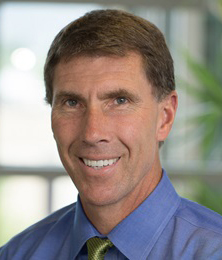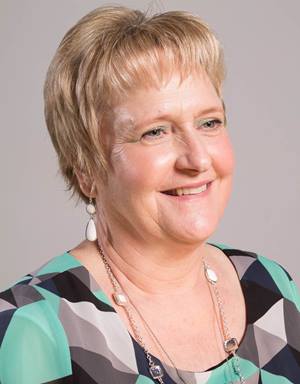
Imagine learning a family member who’d seemed healthy just a few days before had been hospitalized and wasn’t expected to survive. Then when you arrived at the hospital to see her one last time, you weren’t allowed inside because of COVID-19 visitor restrictions. Would you be upset? That’s what happened to a family recently at Utah Valley Hospital. But then the Palliative Care team stepped in and quickly turned things around.
The patient was a younger woman who went from being healthy and active to near death from an illness unrelated to COVID-19 within two weeks. Gary Garner, MD, medical director for the Utah Valley Palliative Care team, says her family was completely unprepared for her sudden decline.

Gary Garner, MD
“They had no idea she was passing away,” Dr. Garner says. “It was a shock that in a very short period of time she ended up being intubated. They’d talked to her just a few days before and she seemed fine. They had no idea she was that ill or that it was the last time they’d talk to her.”
Sarah Stephenson, LCSW, and Kelleen Brown, APRN, had met with the patient’s immediate family and let them know she wasn’t going to recover and it was time to prepare for her death. The family contacted other family members who quickly traveled from out-of-state in hopes of being at her bedside during her final hours. But when they arrived at the hospital, they weren’t allowed into the unit.

Sarah Stephenson, LCSW
“They came after hours and when they were told they wouldn’t be able to visit the ICU, they were understandably very upset,” Sarah says. “Security had to be contacted and it was a very tense situation.”
When Dr. Garner heard what had happened, he wanted to come up with a way the family could have the experience of seeing their loved one last time and getting the closure they needed while still respecting the hospital’s visitor restrictions. He knew Intermountain had recently started a telehealth program for palliative care consults after-hours and in rural facilities, and thought the same technology could also be used for this situation.
The family was invited to come to a large telepresence conference room in the hospital. Then with the help of Travis Benson from CTIS, Dr. Garner connected his laptop to the special telehealth camera in the ICU room, allowing him to focus the camera on anything in the room. He was also able to bring in the nurses and other caregivers who could explain more about what was happening with her care.
Advice from Palliative Care on helping families facing death: -Sarah Stephenson, LCSW: "It's really important to be willing to sit with them and hear their emotions. And you need to be willing to get outside of the box and do whatever is needed to help family members find peace." -Dr. Gary Garner: "It really comes down to relationships and values. Think, 'What was important to this person?' and 'Who was important to this person?' The key is meeting people where they're at. I also recommend the book 'Being Mortal' by Atul Guwande, which talks about what's most important to people and what they want when it comes to serious illness and end-of-life."
“Dr. Garner realized the family wasn’t seeing the full picture, so he was able to pull everyone in and help everyone feel involved in this patient’s last moments,” Sarah says. “He was able to use the camera on the ceiling to zoom in on all the monitors and equipment and explain everything that was going on. They were able to see the patient on the screen larger than life and could see how sick she really was. I think it was brilliant.”
Michelle Siegel, office coordinator, helped set up the meeting and arranged to have Security standing by in an adjacent room in case things got out of hand again, but she and Sarah say it ended up being a very peaceful situation and there was no need for Security.
“Having the patient in the room helped ease the anger,” Sarah says. “The family just expressed a lot of gratitude. They all said, ‘Thank you so much for allowing us to see her.’ They were really grateful to see her and see how sick she was so they could get that closure.”
After the full family meeting, Dr. Garner met with a few of the immediate family members to discuss final details. Just as they were finishing the discussion, a nurse called to let them know the patient had passed away. The family was very distraught and unsure what do about funeral arrangements, so Dr. Garner offered to make a few phone calls and help them gather their options.

Michelle Siegel, Palliative Care office coordinator
“I happened to walk into his office and overheard what he was doing and he told me it was so hard to watch a young man who’d just lost his mother in so much distress that he had to lend him a helping hand,” Michelle says. “He was able to find prices and details for some different mortuaries and shared that information with the patient’s son. That’s going above and beyond.”
Dr. Garner says when it comes to end-of life situations, “often there are no protocols. This isn’t in a book. There are different families and situations. We deal with family dynamics that have been stressed in different ways. We need to meet the family where they are and help where they’re at. People grieve differently. Each person is unique. Thinking out-of-the-box is what we always need to do.”
“I think it’s a really beautiful thing to help people move forward, like we did in this situation,” Sarah says. “It’s one of the most rewarding things about my job. We were able to help the family find some peace, and I don’t think they would’ve been able to otherwise. It’s an honor to be a part of life-altering events like this.”
If you’re treating a patient who's nearing end-of-life, Dr. Garner says the Palliative Care team can help. They can offer services in all Intermountain hospitals. You can order a palliative care consult in iCentra and they’ll be glad to lend a hand.
“We’re always ready to help,” he says. “We’re busy with COVID-19 patients on top of our regular work, but we can always provide support. We don’t take over patient care, we’re just another layer of support. We can help with comfort and coping, both physical and emotional.”

